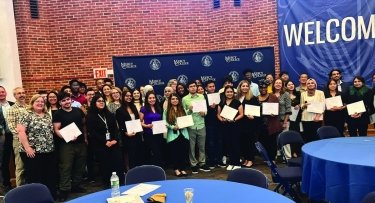Mercy College STEM Ready Summer Research Institute Builds Transfer and Career Pipeline

Mercy College’s STEM Ready Summer Research Institute (SRI) is successfully exposing students from both Mercy and SUNY Westchester Community College (WCC) to STEM careers.
The program, funded by the $4.9 million STEM Ready grant awarded to Mercy in 2021 by the U.S. Department of Education, is part of Mercy’s larger STEM Ready initiative, which aims to 1) increase the number of Hispanic and low-income students attaining degrees in STEM majors at Mercy and 2) build a pipeline between WCC and Mercy to give students an efficient path to earn STEM degrees at Mercy.
SRI is an important part of the STEM Ready initiative. “Faculty-mentored research is a teaching practice that impacts student persistence, increases the number of students pursuing graduate education and provides students with opportunities to develop important professional skills such as collaborating with a diverse team and project management,” said Stuart Sidle, Ph.D., dean of Mercy’s School of Social and Behavioral Sciences and STEM Ready project director.
Through SRI, students receive stipends to work directly with faculty for four weeks on research projects in biology, psychology, mathematics, computer science, cybersecurity and computer information systems. This summer, there are 51 students participating in SRI — 29 from Mercy and 22 from WCC — 10 peer mentors and 14 faculty mentors from both institutions.
“SRI provides a great atmosphere to learn because students are learning for learning’s sake, not to earn a grade,” said Mary Hegarty, assistant program director of STEM Ready. “They have close contact with a professor because the research groups are small. And the skills they learn will prepare them well for STEM careers.”
SRI culminates with students presenting their research findings to the Mercy and WCC communities. Many also present their projects at professional conferences such as the Metropolitan Association of College and University Biologists Conference.
Because SRI provides stipends for all participants, the program attracts students who would not otherwise be able to participate because their circumstances require them to earn money over the summer. Thanks to the stipends, these students can spend the summer gaining critical academic research experience that broadens their career prospects. “The Summer Research Institute awoke a passion in me that I never knew I had,” said R.J. Bradley-Ortiz ’22 who participated in SRI twice and returned this year for her second summer as a peer mentor. “Now, I want to pursue research in my career.” Bradley-Ortiz is currently pursuing a master’s degree in biology at Hunter College.
Many students end up transferring to Mercy to complete their studies after earning an associate degree at WCC. Sidle asserts that inviting WCC students onto campus for SRI helps them feel connected to the Mercy community and more confident about transferring to Mercy. “Connecting with future Mercy STEM students coming to us from WCC is an excellent way to plant the seeds of student success before they officially join us,” he said.
“SRI exemplifies the extraordinary partnership between Mercy and WCC, and it has been beneficial for student and faculty success,” said Carmen Martínez-López, Ph.D., dean of the WCC School of Business and Professional Careers. “SRI allows our students to develop skills in innovation, analytical thinking and teamwork. And our faculty members can advance their research and teaching processes.”
Julia Zavala, Ph.D. — co-activity director of SRI and assistant professor of psychology at Mercy — is leading an SRI project that looks at the factors influencing student engagement in undergraduate college students, specifically social support, anxiety and their status as first-generation college students. “I'm passionate about working with students and helping them develop the skills that will be helpful in the future,” she said.
Zavala’s group of psychology majors are enthusiastic about the research and everything they are learning. “My favorite parts are reading the literature and working with the data,” said Ashley Baez ’25 who participated in SRI last year and returned this summer as a peer mentor. “I like comparing the research that’s out there with the research we’re conducting. And then it's really interesting to add our own study to the literature.”
“Statistics felt overwhelming at first,” said Lenna Gonzalez ’25. “But the more we go over it, I realize there’s nothing to fear. After this summer, I have more of a plan for my career in psychology.”



